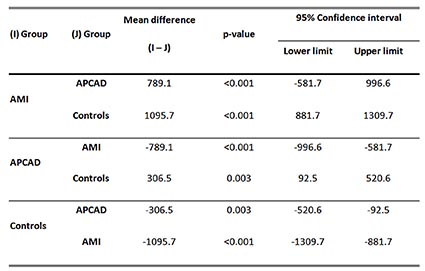
Elevated Antibodies to Oxidized Low Density Lipoprotein are Positively Related with a Severity of Coronary Artery Disease
Abstract
Aim: The prognostic value of circulating antibodies to oxidized low-density lipoprotein (anti-oxLDL) in patients with coronary heart disease is not completely clear. We aimed to investigate the association between levels of anti-oxLDL in three groups of patients with different grades of severity of coronary heart disease. Patients and methods: The study included 101 patients classified into three groups: one (N=35) with acute myocardial infarction (AMI), a group (N=35) with angiographicallly proven coronary artery disease (APCAD), and a group without angiographicallly proven coronary artery disease (N=31) designated as a control group. Levels of IgG anti-oxLDL antibodies were meausured by enzyme-linked immunosorbent assay. Results: Mean anti-oxLDL value was significantly higher in patients with AMI than in patients with APCAS (1342.1±581.5 mIU/ml vs. 553.0±183.3 mIU/ml, p<0.001), as well as compared with control group (1342.1±581.5 mIU/ml vs. 246.5±114.3, p<0.001). Similarly, significant difference in anti-oxLDL levels was found between the patients with APCAS and control group (p<0.001). Conclusions: The present study showed that elevated levels of anti-oxLDL are positively related with a severity of coronary artery disease. Hence, elevated levels of anti-oxLDL may identify patients with unstable coronary heart disease. Oxidized LDL in circulating plasma could serve as a marker of cardiovascular events.
Keywords
oxidized low density lipoprotein; coronary artery disease; myocardial infarction; coronarography
DOI: 10.5457/ams.v39i1.120
